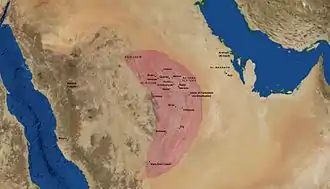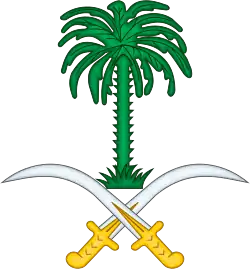Al-Yamama
Al-Yamamah (Arabic: اليمامة, romanized: al-Yamāmah) is an ancient historical region lying in the Najd region of modern-day Saudi Arabia, or sometimes more specifically, the now-extinct ancient village of Jaww Al-Yamamah, near Al-Kharj, after which the rest of the region was named. Only a handful of centralized states ever arose in Yamamah, but it figured prominently in early Islamic history due to it becoming a central theater in the Ridda Wars immediately following Muhammad's death. Despite being incorporated into the Najd region, the term 'Al-Yamamah' remains in use as a traditional and historical term to reference or emphasize the region's ancient past. The current headquarters of the Saudi government in Riyadh, for example, is known as the Palace of Yamamah.

Salit bin Amri was sent by Muhammad with a letter to Hozah bin Ali to the king of Yamama to invite him to Islam during the Expedition of Zaid ibn Haritha that took place in 628 AD.[1][2]
See also
References
- Safiur-Rahman Mubarakpuri, The Sealed Nectar, p. 227
- Akbar Shāh Ḵẖān Najībābādī, History of Islam, Volume 1, p. 194. Quote: "Again, the Holy Prophet «P sent Dihyah bin Khalifa Kalbi to the Byzantine king Heraclius, Hatib bin Abi Baltaeh to the king of Egypt and Alexandria; Allabn Al-Hazermi to Munzer bin Sawa the king of Bahrain; Amer bin Aas to the king of Oman. Salit bin Amri to Hozah bin Ali— the king of Yamama; Shiya bin Wahab to Haris bin Ghasanni to the king of Damascus"
